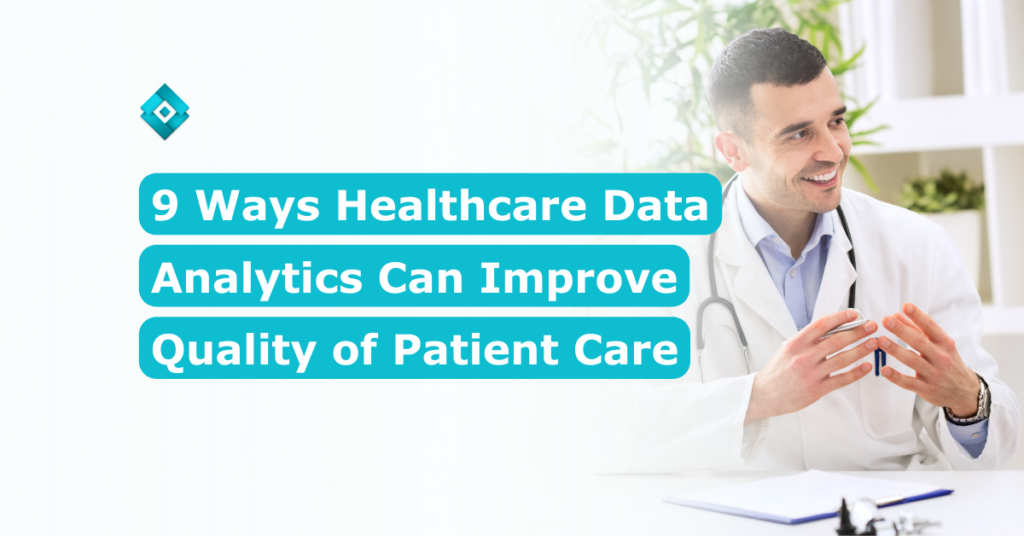Does data analytics can improve the quality of patient care?
There’s one truth that we need to accept–data analytics can improve the quality of patient care. It has become a valuable asset for medical professionals like you seeking to improve patient care outcomes. Notably, integrating healthcare data analytics has revolutionized how you access, analyze and interpret patient information.
In addition, this powerful tool enables evidence-based decision-making, enhances care coordination, and optimizes resource allocation. Keep reading because we’ll explore how healthcare data analytics can improve the quality of patient care. Let’s see how it leads to better clinical outcomes and patient satisfaction.
Browse until the end to learn how data analytics can improve the quality of patient care!

1. Identifying high-risk patients
Healthcare data analytics can effectively identify high-risk patients, allowing medical professionals to intervene and prevent adverse events proactively. By analyzing patient data, such as medical history, demographic information, and lifestyle factors, you can create predictive models.
With this in mind, it aims to identify individuals at risk for specific conditions or complications. This enables healthcare providers like you to allocate resources efficiently and conduct targeted interventions. Ultimately, this will help you provide personalized care plans for those most in need.

2. Enhancing clinical decision-making
Data-driven insights empower healthcare professionals to make informed and evidence-based decisions. This is crucial to know as data analytics can improve the quality of patient care. Particularly, advanced analytics can process vast patient data, including diagnostic test results, treatment outcomes, and population health trends.
With this information, doctors like you can confidently choose the most appropriate treatment options. You can also optimize medication regimens and tailor care plans to individual patient needs, eventually leading to better clinical outcomes.

3. Improving care coordination
Seamless care coordination is critical in comprehensive patient care, especially in complex healthcare systems. This is why you need to learn how data analytics can improve the quality of patient care. Certainly, it facilitates the exchange of patient information between multiple providers and care settings.
As a result, it ensures that every care team member has access to up-to-date and accurate patient data. This real-time collaboration enhances care coordination, reduces medical errors, and avoids redundant testing, resulting in more efficient and patient-centric care.

4. Enhancing patient engagement
Engaged patients are more likely to take an active role in their health management, leading to better health outcomes. With this in mind, data analytics can generate patient-friendly reports and visualizations. Accordingly, this helps individuals understand their health status, treatment progress, and potential risk factors.
Similarly, these tools enable patients to be actively involved in their care, make informed decisions, and adhere to treatment plans. All in all, it strongly shows how data analytics can improve the quality of patient care.
Read here to know the Recurring Tasks Performed By A Virtual Medical Assistant

5. Streamlining population health management
Population health management involves understanding and addressing the health needs of specific groups of patients. To help you with these, it’s crucial you understand how data analytics can improve the quality of patient care. Specifically, it can analyze data from various sources, including electronic health records, insurance claims, and social determinants of health.
With this in mind, data analytics can identify health trends and patterns within a population. This information allows healthcare providers like you to implement targeted interventions, preventive measures, and health education initiatives. Altogether, this will lead to healthier communities and reduced healthcare costs.

6. Predictive analytics for early detection
Predictive analytics plays a crucial role in early detection and intervention. This is one of the ways data analytics can improve the quality of patient care. By analyzing historical patient data, you can identify subtle changes that may indicate the onset of certain medical conditions.
Particularly, predictive models can alert care teams to potential health risks, enabling timely intervention and preventive measures. Overall, early detection improves patient outcomes and reduces the burden on healthcare resources and the cost of treatment.

7. Monitoring treatment effectiveness
It’s critical to recognize that data analytics can improve the quality of patient care. One of which is that it is valuable for assessing treatment effectiveness and patient response to interventions. By tracking patient outcomes and comparing them with relevant benchmarks, healthcare professionals can gauge the success of various treatments.
Additionally, you can adjust care plans accordingly. This data-driven approach ensures patients receive the most effective treatments, improving recovery rates and reducing hospital readmissions.

8. Enhancing patient safety
Patient safety is a top priority for healthcare providers. This is where your knowledge of how data analytics can improve the quality of patient care comes in. With this, you can use relevant data to identify safety concerns and potential adverse events. In effect, this will facilitate the implementation of preventive measures.
In addition, analyzing patient safety data can identify system-level issues. This includes medication errors or surgical complications, prompting process improvements and enhancing overall patient safety.

9. Cost optimization and resource allocation
Efficient use of resources is pivotal for healthcare organizations. This is where you need help as data analytics can improve the quality of patient care. It enables healthcare professionals to identify areas where they can optimize their resources.
These resources include supply chain management, staffing, and patient flow. By identifying inefficiencies and reducing waste, you can allocate resources more effectively. As a result, this provides quality care without unnecessary financial burdens.
Leverage our Virtual Medical Assistants to integrate Healthcare Data Analytics in your practice!
In today’s fast-paced healthcare industry, data analytics is essential to provide the best possible care for patients. However, you can’t do everything alone while still focusing on your patients. Fortunately, you can achieve this by leveraging the skills of Virtual Medical Assistants. They are in a unique position to help integrate data analytics into your practice.
By analyzing patient data, Virtual Medical Assistants can identify patterns and trends that you may have missed. In effect, this allows providers like you to make more informed decisions about patient care. This not only leads to improved health outcomes for patients but also helps practices like yours run more efficiently. If you want to improve patient care in your practice, click here for a quick and free discovery call!








